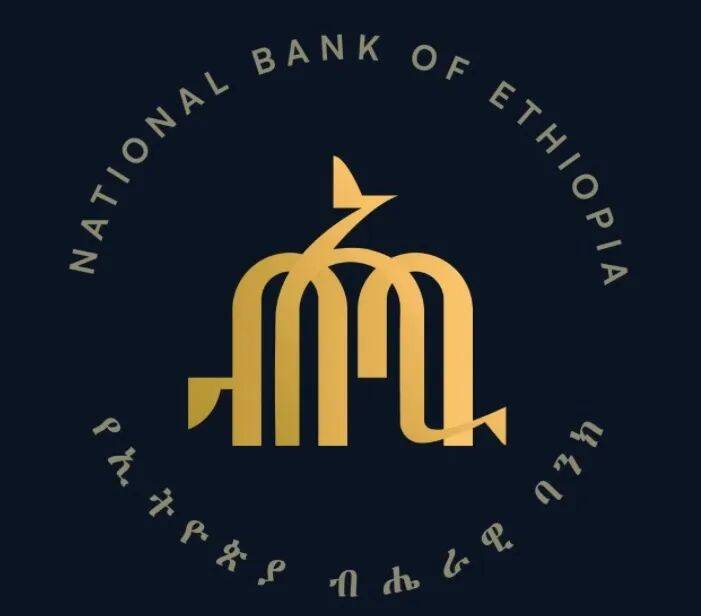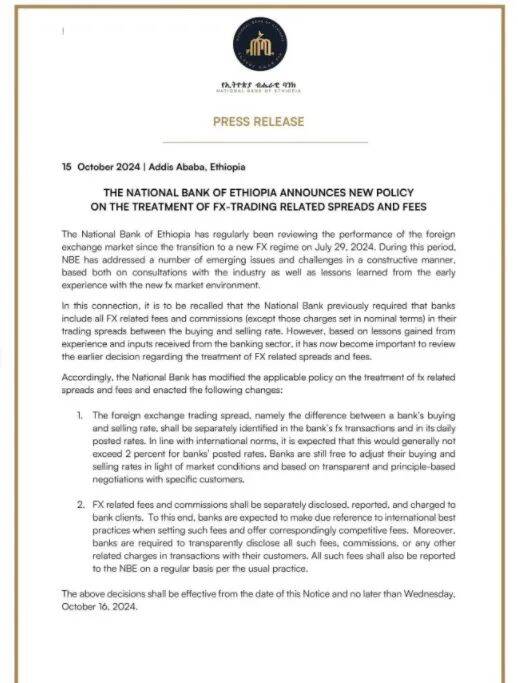The National Bank of Ethiopia releases new foreign exchange policy!
According to Ethiopian media reports, the National Bank of Ethiopia (NBE) launched a new policy on October 15th to limit the difference between the buying and selling prices of foreign exchange transactions to 2 per cent. And the policy adjustment will come into effect on October 16, 2024, following a review of the foreign exchange market after the introduction of the new foreign exchange system in July 2024.

According to the Ethiopian National Bank, the foreign exchange trading margin should be determined, and the published exchange rate should not exceed 2%. Banks will retain the flexibility to adjust interest rates according to market conditions and on the basis of transparent and principle-based negotiations with specific customers. In addition to limiting trading spreads, Ethiopia National Bank said that banks must transparently disclose all fees, commissions or other fees for transactions with customers, and that these fees must also be reported to the national bank in accordance with current practices.
It is reported that at the end of July this year, Ethiopia issued a transition to a market-based foreign exchange system, aimed at addressing part of a broader economic reform that has long distorted the economy, narrowing the gap between official interest rates and parallel market (black market) interest rates, and this reform can replace the previous exchange rate system in a more flexible way.

However, after the release, the exchange rate of the Ethiopian bill fell sharply. Before the release of the new policy, the Ethiopian bill exchange rate traded by commercial banks was about 57 bill to the dollar, with a direct spread of less than 1 bill. By October 12th, the average selling price had soared to 125 bill to the dollar, with a spread of more than 10 bill. However, after Ethiopia National Bank issued the new policy on October 15, Ethiopia Commercial Bank immediately adjusted the interest rate, adjusting the buying price to 113 bill, the selling price to 115 bill, and the spread narrowed from 11.23 bill to 2.26 bill.
It is understood that before the release of the policy, the bid-ask spread in the Ethiopian foreign exchange market exceeded 10 bires, which had a lot of impact on the country's exports. For example, on October 14, the buying price of most Ethiopian banks for one dollar was about 112 bill, while the sale price was about 123 bill, so local exporters and companies had to pay for the transportation of the goods at a higher selling rate of 123 bill. however, when these exporters receive payment for exports, the bank will exchange 112 bills for US dollars at the buying rate and pay the fee at the lower purchase price.
Therefore, higher freight rates and lower income prices seriously affect the profitability and overall business operations of these companies, and may cause some exporters to increase their income through commodity price increases. For example, the minimum price of coffee beans exported by Ethiopia has increased by 2%.
However, the new policy is beneficial to Ethiopian exporters. The limit of 2% difference between the buying and selling prices of foreign exchange transactions will help to prevent banks from making unreasonable profits through excessive price spreads, thus protecting the rights and interests of traders. Banks are also required to separately disclose relevant fees and commissions to customers to ensure the transparency of the transaction.
For the current major coffee industry in Ethiopia, the cost of coffee cultivation and living is rising due to previous policies, exchange rates and parallel markets (black market). So exporters can only maintain their income by raising prices. The new policy is not only conducive to the export of goods such as coffee, but also reduce the cost of imported goods, thereby increasing income.
However, at present, Ethiopia is still suffering from internal and external troubles. Large-scale conflicts have broken out in Amhara state in north-central Ethiopia in recent days, and weapons of mass destruction are still being used or even used between Ethiopian government forces and Farno armed forces, affecting the regional economy and people's lives. In addition, in early October, the Houthi announced the continuation of more military operations, and the continued naval blockade in the Red Sea area also continued to affect Ethiopia's import and export operations. And relations with neighboring Somalia have not eased, so the port issue remains one of the country's priority issues.
For more information about coffee producing areas, please scan the code directly and follow: coffee comments.
Long press the QR code to follow:
TRANSLATE with
XEnglishArabicHebrewPolishBulgarianHindiPortugueseCatalanHmong DawRomanianChinese SimplifiedHungarianRussianChinese TraditionalIndonesianSlovakCzechItalianSlovenianDanishJapaneseSpanishDutchKlingonSwedishEnglishKoreanThaiEstonianLatvianTurkishFinnishLithuanianUkrainianFrenchMalayUrduGermanMalteseVietnameseGreekNorwegianWelshHaitian CreolePersian
TRANSLATE with
COPY THE URL BELOW
BackEMBED THE SNIPPET BELOW IN YOUR SITE Bing Webmaster PortalBack
Important Notice :
前街咖啡 FrontStreet Coffee has moved to new addredd:
FrontStreet Coffee Address: 315,Donghua East Road,GuangZhou
Tel:020 38364473
- Prev

A pack of talisman paper, can you get merit by drinking coffee?!
▲ Click to pay attention| Daily Boutique Coffee Culture Magazine Coffee Workshop Recently, a cup of "Gongde Coffee" wrapped in bright yellow talisman paper attracted the attention of netizens. It is reported that this specially packaged drink was launched by a coffee shop opened around the temple. The bright yellow symbol paper used to package drinks is not a casually printed packaging online
- Next

Why do Indonesian Mantonin coffee beans use wet planing?
When it comes to Shenhong coffee, many people will think of Asian coffee beans, the most common one being coffee from Indonesia. Especially Mantelin coffee, which is famous for its mellow and fragrant nature. Currently, there are two types of Manterin coffees in Qianjie Coffee, namely Lindong Manterin and Golden Manterin. Golden Mantelin coffee beans are made from wet
Related
- What grade does Jamaica Blue Mountain No. 1 coffee belong to and how to drink it better? What is the highest grade of Blue Mountain coffee for coffee aristocrats?
- What are the flavor characteristics of the world-famous coffee Blue Mountain No. 1 Golden Mantelin? What are the characteristics of deep-roasted bitter coffee?
- Can I make coffee a second time in an Italian hand-brewed mocha pot? Why can't coffee be brewed several times like tea leaves?
- Hand-brewed coffee flows with a knife and a tornado. How to brew it? What is the proportion of grinding water and water temperature divided into?
- What is the difference between Indonesian Sumatra Mantinin coffee and gold Mantinin? How to distinguish between real and fake golden Mantelin coffee?
- What does bypass mean in coffee? Why can hand-brewed coffee and water make it better?
- Unexpected! Ruixing Telunsu lattes use a smoothie machine to foam milk?!
- % Arabia's first store in Henan opens into the village?! Netizen: Thought it was P's
- Does an authentic standard mocha coffee recipe use chocolate sauce or powder? Mocha Latte/Dirty Coffee/Salty Mocha Coffee Recipe Share!
- What is the difference between Vietnam egg coffee and Norway egg coffee? Hand-brewed single product coffee filter paper filter cloth filter flat solution!

